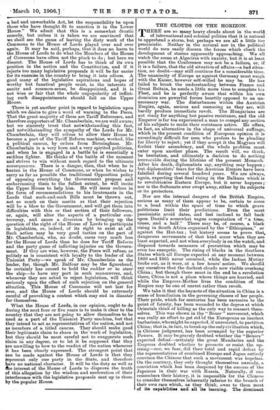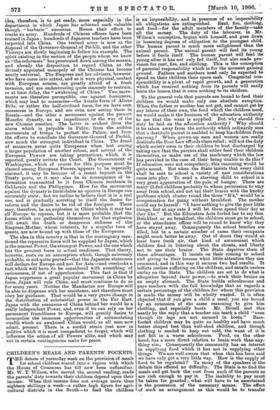THE CLOUDS ON THE HORIZON. T HERE are so many heavy
clouds about in the world of international and colonial politics that it is natural to apprehend a storm, but perhaps we are all a little too pessimistic. Neither in the natural nor in the political world do men easily discern the forces which check the development of storms apparently approaching. We all watch the scene at Algeciras with anxiety, but it is at least possible that the Conference may not be a failure, or, if it is a failure, that the old situation of affairs—a bad situa- tion, no doubt—may still continue for a considerable time. The unanimity of Europe as against Germany must weigh with the Kaiser, however self-willed he may be. He has failed to break the understanding between France and Great Britain, he needs a little more time to complete his Fleet, and he is perfectly aware that within his own dominion are powerful forces heartily opposed to an un- necessary war. The disturbances within the Austrian Empire, again, serious and menacing as they are, will hardly produce immediate revolt. The Hungarians are not ready for anything but passive resistance, and the old Emperor is far to experienced a man to compel any section of his subjects to make their resistance active. He offers, in fact, an alternative in the shape of universal suffrage, which in the present condition of luropean opinion it is exceedingly difficult for men who profess to be pleading for liberty to reject ; yet if they accept it the Magyars will forfeit their ascendency, and the whole problem must, enter upon another phase. The result will, we think, be hesitation, and ultimately a decision to do nothing irrevocable during the lifetime of the present Monarch. After his death, diplomatists say, anything may happen ; - but diplomatists' fears for the Austrian Empire have been falsified during several hundred years. We are always, again, expecting that final rising in the Balkans which is to revolutionise Eastern Europe, but it never happens nor is the Sultanate ever swept away, either by its subjects or its protectors.
Nor are the internal dangers of the British Empire, serious as many of them appear to be, certain to come to a head within the space of time to which grave politicians limit their predictions. Even the most pessimistic avoid dates, and feel inclined to fall back upon Daniel's somewhat vague computation of "a time, times, and a half." There may be, of course, a black rising in South Africa organised by the "Ethiopians," or against the Hut-tax ; but history seems to prove that.. dangerous movements of that kind occur when they are least expected, and not when everybody is on the watch, and• disposed towards measures of prevention which may be even too energetic. The rising of blacks in the Southern States which all Europe expected at any moment between 1860 and 1865 never occurred, while the Indian Mutiny broke out, as it were, at a few hours' notice. We shoilld say ourselves that the darkest clouds now visible overhang China ; but though there must in the end be a revolution there, China is not a place where things are hurried, and while the Empress-Mother lives the condition of the Empire may be one of unrest rather than revolt.
We take it that the keynote of the situation in China is a sense of humiliation in the governing classes of her people. Their pride, which for centuries has been excessive to the point of fatuity, has been wounded to the degree at which Orientals think of killing as the only way to reassert them- selves. This was shown in the " Boxer ' movement, which was really an effort to get rid 'of the Europeans as insolent barbarians, who might be expected, if unresisted, to partition China; that is, in fact, to break up the only civilisation which, in Chinese judgment, has been arranged by the superior Powers. It may be gravely doubted whether the "Boxers" expected defeat—certainly the great Mandarins and the Empress doubted whether to promote or resist the up- rising—nor, we fear, did their total and rapid defeat by the representatives of combined Europe and Japan entirely convince the Chinese that such a movement was hopeless. On the contrary, they only thought themselves unready, a. conviction which has been deepened by the success of the Japanese in their war with Russia. Naturally, if one remembers their history, it is impossible for the Chinese to consider themselves inherently inferior to the branch of their own race which, as they think, owes to them most of its capabilities and- all its learning. The dominant idea, therefore, is to get ready, more especially in the department in which Japan has achieved, such valuable though " barbaric " successes. Hence their effort to create an army. Hundreds of Chinese officers have been trained in Japan ; hundreds of Japanese teachers have been imported into China. One trained army is now at the disposal of the Governor-General of Pechili, and the other Viceroys are elowly beginning to follow his example. The spirit existing in the section of the people whom we know as "the reformers" has penetrated down among the masses, and already the disposition to regard China as the divinely appointed monopoly of the Chinese has become nearly universal. The Empress and her advisers, however, who have come into actual, and as it were physical, contact with European armies, are greatly afraid of a fresh invasion, and are endeavouring quite sincerely to restrain, or at least delay, the "awakening of China." Two move- ments are therefore perceptible, one against foreigners, which may lead to massacres—the Asiatic form of Aliens Bills, or rather the half-civilised form, for we have seen massacres in Europe, and are even now seeing them in Russia—and the other a movement against the present Manchu dynatity, as an impediment in the way of the new Chinese emotion. The latter is evident from the alarm which is palpable in Pekin, from the sudden movements of troops to protect the Palace, and from the efforts to conciliate the Governor-General of Pechili, now much the strongest individual in China. The dread of massacre never quits Europeans when lost among a larger population of another colour, and several of the European Powers are taking precautions, which, it is reported, greatly irritate the Court. The Government of -Washington, which of course for this purpose must be classed among European Powers, appears to be especially alarmed, it may be because of a recent boycott in the Treaty ports, or it may also be in consequence of in- formation transmitted to it from Chinese residents in California and the Philippines. How far the movement against the dynasty is formidable no opinion in Europe can accurately state; but we incline to believe that it is a real one, and is gradually accreting to itself the desire for reform and the desire to be rid of the foreigner. There may, therefore, be an explosion in China which it may tax all Europe to repress, but it is more probable that the forces which are gathering themselves for that explosion will await the death or dangerous sickness of the Empress-Mother, whose interests, by a singular turn of vents, are now bound up with those of the Europeans.
The idea in this country is that in the contingency men- tioned the repressive force will be supplied by Japan, which is the nearest Power, the strongest Power, and the one which has the greatest force in actual readiness. That theory, however, rests on an assumption which, though extremely probable, is not quite proved—that the Japanese statesmen will declare for Europe and not for Asia—and overlooks a fact which will have to be considered with something of seriousness, if not of apprehension. This fact is that if Japan suppresses a great popular movement in China by force, Japan will rule China, and must continue to do so for many years. Neither the Mandarins nor Europe will be able to dispense with her assistance, and therefore must obey her guidance. That would be a very grave change in the distribution of substantial power in the Far East. Japan with the resources of China behind her would be a really independent Power, and, even if we can rely on her permanent friendliness to Europe, will greatly desire to monopolise the immense opportunities of accumulating wealth which an awakened China would, as all men now admit, present. There is a sordid strain just now in politics which it is most inexpedient to forget, which will influence the action of all Powers alike, and which may not in certain contingencies make for peace.











































 Previous page
Previous page